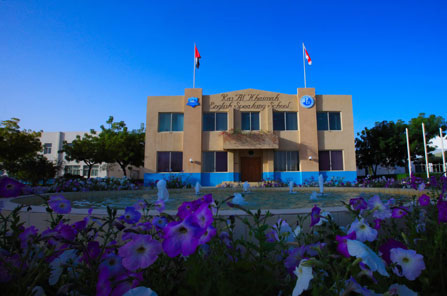Education
Given the drive to become a knowledge-based economy, numerous education initiatives and reforms are underway in Ras Al Khaimah and the UAE. These efforts seek to enhance the quality of the educational system and focus on supporting innovation and student success.
Improving the quality of RAK's education sector has been a priority of His Highness Sheikh Saud Bin Saqr Al Qasimi since he was named Crown Prince in 2003.
Public and Private School
RAK's rapid economic development and steady population growth have increased local
demand for educational institutions (Kindergarten to Secondary) both public and
private.
As of 2012, there are a total of 114 schools and early education facilities operating in RAK. There are 90 public schools managed by the government educating over 31,000 students. In the past 10 years, enrollment in private schools has more than doubled, going from 8,959 in 2001/2002 to 18,059 students in 24 schools in 2011/2012.
The structure of RAK's public education sector is similar to that of the other Emirates. Public schools in RAK follow the standard Ministry of Education (MoE) curriculum, and the language of instruction is Arabic.
The Emirate's private schools, which cater both to local and expatriate communities, generally follow British or Indian curriculum models.
The Emirate's flagship English-language private school is RAK Academy, which was founded in 1975 under His Highness Sheikh Saud's patronage. The school enrolled 2,800 students for the 2012/2013 academic year, and has offered the challenging International Baccalaureate degree track since 2006. RAK Academy graduates routinely continue their education at top universities in the UAE, Europe, and the UK.
Higher Education
Higher education in the UAE is comprised of public,
semi-public and private institutions, which offer various degrees at the
bachelors, masters, and doctoral levels. Public universities provide Emirati
students with English-language instruction in a variety of disciplines. Ras Al Khaimah hosts men's and
women's campuses of the federally funded Higher
Colleges of Technology, which prepares its graduates to make immediate
contributions to the local economy in fields such as tourism, engineering, and
business management.
Private and RAK Government-supported institutions have traditionally served foreign/expatriate students, but several universities in RAK enroll a high percentage of Emiratis as well. The most prominent are the American University of Ras Al Khaimah and the RAK Medical and Health Sciences University, which graduated its third class of doctors, nurses, and pharmacists in September 2013.
Free Trade Zone for Education
A number of universities have chosen to establish
themselves under the auspices of the RAK Free Trade Zone, including India's Bharati Vidyapeeth University,
the UK's University of
Bolton, and the Vatel International Business School for Hotel and Tourism
Management. The FTZ's dedicated Academic Zone offers universities from
around the world specialized support and expertise, guiding them through the
process of establishing a new home in RAK.
In March 2013, CORE Education announced plans to invest a total of $2m to develop an academic learning center in RAK FTZ. The CORE International Institute of Higher Education will offer programs at both the undergraduate and post-graduate levels and will focus on engineering, architecture and business administration (including an MBA degree course).
Improving Education for the Future
The Ministry of Education (MoE) is currently implementing a series
of five-year strategies under the Education 2020 plan to strengthen the sector
and improve outcomes. In 2010, the MoE initiated a
mentoring program that partnered local principals in 50 public schools with
Western counterparts. In addition, the education plan calls for measuring
student outcomes and developing a national recruiting system that includes
performance evaluation tools to assess teachers, teacher-training programs and
improved regulations.
Education 2020 marked a shift towards encouraging critical thinking and practical skills, and calls for a significant push to train teachers and modernize public schools. The plan is backed by investments of almost Dh7.4bn ($2bn).
Research and Thought Leadership
Fostering a culture of excellence in education requires long-term vision and investment in
the right partnerships.
The Sheikh Saud Al Qasimi Foundation for Policy Research was founded in 2009 to assist the Emirate's development through targeted research programs and innovative education-focused initiatives. The Foundation has been internationally recognized as a leading young think tank, and has contributed to Ras Al Khaimah's academic growth by sponsoring teacher enrichment programs and exchanges, providing scholarships to local students, and hosting scholars researching aspects of culture, history, and policymaking in the Gulf.
In August 2013, His Highness Sheikh Saud inaugurated the Sheikh Saqr Laboratory at the Jawahrlal Nehru Centre for Advanced Scientific Research in Bangalore, India. The lab is headed by renowned Indian chemist and Bharat Ratna laureate CNR Rao, and is an extension of the mission of the RAK Center for Advanced Materials, which brings together leading materials scientists for an annual academic conference in Ras Al Khaimah. RAK CAM also arranges for its professors and scientists to visit schools throughout the Emirate, sharing the value of a career in research with the next generation.
Undertakings like these help to share the Emirate's commitment to education with friends all over the world and to allow students in RAK opportunities to expand their horizons by pursuing their studies at the highest level.

